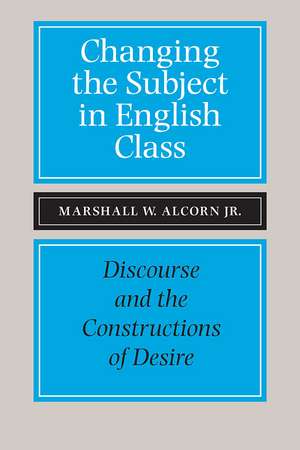Changing the Subject in English Class: Discourse and the Constructions of Desires
Autor Marshall W Alcorn, Jren Limba Engleză Paperback – 19 mar 2002
Drawing on the theoretical work of Jacques Lacan, Marshall W. Alcorn Jr. formulates a systematic explanation of the function and value of desire in writing instruction.
Alcorn argues that in changing the subject matter of writing instruction in order to change student opinions, composition instructors have come to adopt an insufficiently complex understanding of subjectivity. This oversimplification hinders attempts to foster cultural change. Alcorn proposes an alternative mode of instruction that makes effective use of students’ knowledge and desire. The resulting freedom in expression—personal as well as political—engenders the recognition, circulation, and elaboration of desire necessary for both human communication and effective politics.
Responding to James Berlin’s reconception of praxis in the classroom, Theresa Ebert’s espousal of disciplined instructions, and Lester Faigley’s introduction of a postmodern theory of subjectivity, Alcorn follows both Lacan and Slavoj Žižek in insisting desire be given free voice and serious recognition. In composition as in politics, desire is the ground of agency. Competing expressions of desire should generate a dialectic in social-epistemic discourse that encourages enlightenment over cynicism and social development over authoritarian demands.
With clarity and personal voice, Alcorn explains how discourse is rooted in primitive psychological functions of desire and responds to complex cultural needs. In its theoretical scope this book describes a new pedagogy that links thought to emotion and the personal to the social.
Alcorn argues that in changing the subject matter of writing instruction in order to change student opinions, composition instructors have come to adopt an insufficiently complex understanding of subjectivity. This oversimplification hinders attempts to foster cultural change. Alcorn proposes an alternative mode of instruction that makes effective use of students’ knowledge and desire. The resulting freedom in expression—personal as well as political—engenders the recognition, circulation, and elaboration of desire necessary for both human communication and effective politics.
Responding to James Berlin’s reconception of praxis in the classroom, Theresa Ebert’s espousal of disciplined instructions, and Lester Faigley’s introduction of a postmodern theory of subjectivity, Alcorn follows both Lacan and Slavoj Žižek in insisting desire be given free voice and serious recognition. In composition as in politics, desire is the ground of agency. Competing expressions of desire should generate a dialectic in social-epistemic discourse that encourages enlightenment over cynicism and social development over authoritarian demands.
With clarity and personal voice, Alcorn explains how discourse is rooted in primitive psychological functions of desire and responds to complex cultural needs. In its theoretical scope this book describes a new pedagogy that links thought to emotion and the personal to the social.
Preț: 264.27 lei
Preț vechi: 363.43 lei
-27% Nou
Puncte Express: 396
Preț estimativ în valută:
50.57€ • 54.07$ • 42.16£
50.57€ • 54.07$ • 42.16£
Carte indisponibilă temporar
Doresc să fiu notificat când acest titlu va fi disponibil:
Se trimite...
Preluare comenzi: 021 569.72.76
Specificații
ISBN-13: 9780809324279
ISBN-10: 080932427X
Pagini: 168
Dimensiuni: 152 x 229 x 15 mm
Greutate: 0.24 kg
Ediția:1st Edition
Editura: Southern Illinois University Press
Colecția Southern Illinois University Press
ISBN-10: 080932427X
Pagini: 168
Dimensiuni: 152 x 229 x 15 mm
Greutate: 0.24 kg
Ediția:1st Edition
Editura: Southern Illinois University Press
Colecția Southern Illinois University Press
Notă biografică
Marshall W. Alcorn Jr. is an associate professor of English, Humanities, and the Program in the Human Sciences at George Washington University. He is the author of Narcissism and the Literary Libido.
Recenzii
“[P]rovocative in the best sense of that word, . . . this book is a gift to so many scholars and students in the field who direly need its explanations and insights, [and] is of the utmost importance to our field if it is to grow and really begin to practice the self-critique that it so highly values.”—Victor J. Vitanza, editor of Writing Histories of Rhetoric
